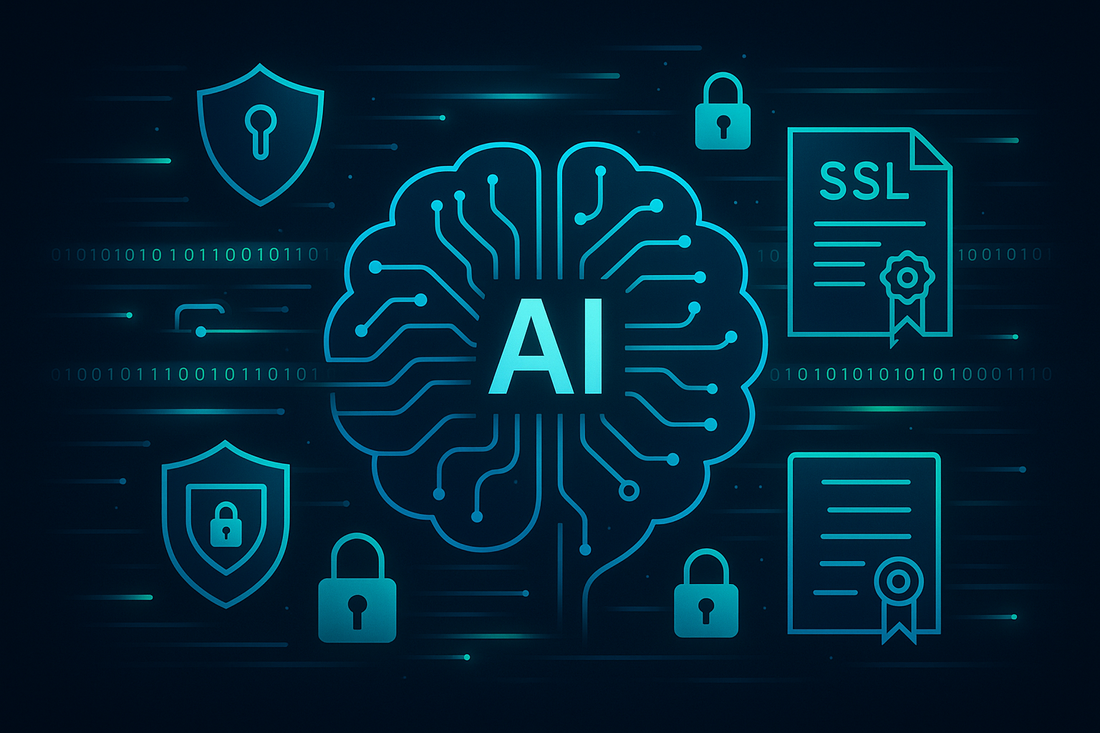
Impact of AI on Cybersecurity
David ChenShare
Artificial Intelligence is fundamentally reshaping the cybersecurity landscape, creating unprecedented opportunities for threat detection and response while simultaneously introducing new vulnerabilities that organizations must address.
For SSL Certificate professionals and system administrators, understanding these dual effects is crucial for maintaining robust security postures in an increasingly AI-driven world.
Trustico® SSL Certificates provide the foundational encryption layer that becomes even more critical as AI technologies evolve and cyber threats become more sophisticated.
The integration of AI into cybersecurity represents both the greatest advancement and the most significant challenge facing digital security professionals today. As organizations deploy AI-powered security solutions, they must also prepare for AI-enhanced attacks that can adapt and evolve in real-time.
This dynamic creates an arms race where defensive and offensive capabilities continuously escalate, making traditional security measures insufficient without proper SSL Certificate implementation and advanced encryption protocols.
AI-Powered Cybersecurity Advantages : Enhanced Threat Detection and Response
Machine learning algorithms excel at pattern recognition, making them invaluable for identifying previously unknown threats and anomalous behavior patterns. These systems can process vast amounts of network traffic data, analyzing SSL Certificate usage patterns, encryption protocols, and communication flows to detect subtle indicators of compromise that human analysts might miss.
Trustico® SSL Certificates integrate seamlessly with AI-powered security platforms, providing the encrypted communication channels that these systems require for secure data transmission and analysis.
AI-driven security systems can monitor SSL Certificate validity, detect SSL Certificate anomalies, and automatically flag potential man-in-the-middle attacks or SSL Certificate spoofing attempts. This automated monitoring capability is particularly valuable when managing large SSL Certificate deployments across enterprise environments.
Organizations using Trustico® SSL Certificates benefit from enhanced visibility into their SSL Certificate infrastructure, enabling AI systems to make more informed security decisions based on comprehensive SSL Certificate data.
Behavioral analytics powered by machine learning can establish baseline patterns for normal SSL Certificate usage across different applications and services. When deviations occur, such as unexpected SSL Certificate changes or unusual encryption patterns, AI systems can immediately alert security teams and initiate automated response protocols.
This proactive approach to SSL Certificate management significantly reduces the window of opportunity for attackers to exploit SSL Certificate-related vulnerabilities.
Automated Defense Mechanisms : AI-Enhanced SSL Certificate Management
Automation represents one of the most significant benefits of AI in cybersecurity, particularly in SSL Certificate lifecycle management.
AI systems can automatically monitor SSL Certificate expiration dates, initiate renewal processes, and deploy updated SSL Certificates across distributed infrastructure without human intervention.
Intelligent SSL Certificate provisioning systems can analyze application requirements, security policies, and compliance mandates to automatically select appropriate SSL Certificate types and configurations. Whether organizations require Domain Validation (DV) SSL Certificates for basic encryption, Organization Validation (OV) SSL Certificates for enhanced trust, or Extended Validation (EV) SSL Certificates for maximum security assurance, AI systems can make these determinations based on predefined criteria and risk assessments.
AI-powered systems can also optimize SSL Certificate deployment strategies, determining the most efficient distribution methods, identifying potential conflicts or compatibility issues, and scheduling updates during maintenance windows to minimize service disruption.
Sectigo® branded SSL Certificates available through Trustico® provide the flexibility and compatibility that AI systems need to implement these sophisticated deployment strategies effectively.
Emerging AI-Driven Cyber Threats : New Attack Vectors and Vulnerabilities
While AI enhances defensive capabilities, it simultaneously empowers cybercriminals with sophisticated attack tools that can bypass traditional security measures.
AI-generated phishing campaigns can create highly convincing fake websites complete with fraudulent SSL Certificates that appear legitimate to unsuspecting users. These attacks leverage machine learning to analyze successful phishing techniques and continuously refine their approaches based on victim responses and security countermeasures.
Adversarial machine learning represents a particularly concerning threat where attackers manipulate AI systems by feeding them carefully crafted input designed to cause misclassification or system failures.
In the context of SSL Certificate security, this could involve creating SSL Certificate requests or network traffic patterns that fool AI-powered security systems into approving malicious SSL Certificates or overlooking suspicious encrypted communications.
AI-powered malware can adapt its behavior based on the security environment it encounters, potentially altering its communication patterns, encryption methods, or SSL Certificate usage to evade detection.
This adaptive capability makes traditional signature-based detection methods ineffective and requires security systems to employ equally sophisticated AI-driven countermeasures.
Trustico® SSL Certificates provide the robust encryption foundation necessary to maintain secure communications even when facing these advanced AI-enhanced threats.
Certificate Authority Security in the AI Era : Enhanced Validation and Issuance
Certificate Authorities (CAs) must evolve their validation and issuance processes to address AI-related risks while leveraging AI benefits for improved security.
Machine learning algorithms can analyze SSL Certificate requests for indicators of fraudulent activity, examining domain ownership patterns, organizational information, and historical data to identify potentially malicious SSL Certificate requests before issuance occurs.
AI systems can enhance the validation process by cross-referencing multiple data sources, analyzing domain reputation scores, and identifying suspicious patterns in SSL Certificate requests that might indicate automated attack tools or compromised systems.
Trustico® SSL Certificates benefit from these enhanced validation processes, ensuring that only legitimate SSL Certificate requests are approved and issued to authorized parties.
Continuous monitoring of issued SSL Certificates using AI-powered systems enables rapid detection of SSL Certificate misuse or compromise. These systems can identify SSL Certificates being used for malicious purposes, detect unauthorized SSL Certificate installations, and trigger revocation processes when necessary.
This proactive approach to SSL Certificate lifecycle management significantly reduces the risk of SSL Certificate-based attacks and maintains the integrity of the overall PKI infrastructure.
Machine Learning Applications in SSL Certificate Security
Machine learning models can analyze SSL Certificate metadata, including issuer information, validity periods, key sizes, and signature algorithms, to identify patterns associated with legitimate versus malicious SSL Certificates.
These models continuously learn from new SSL Certificate data, improving their accuracy over time and adapting to emerging threat patterns. Organizations deploying Trustico® SSL Certificates can leverage these machine learning capabilities to enhance their overall security posture.
Anomaly detection algorithms can identify unusual SSL Certificate behavior, such as SSL Certificates with suspicious domain names, unexpected geographic origins, or atypical validity periods. These systems can flag potentially malicious SSL Certificates for further investigation before they can be used in attacks.
Predictive analytics can forecast SSL Certificate-related security risks based on historical data, threat intelligence feeds, and emerging attack patterns. These predictions enable organizations to proactively strengthen their SSL Certificate security measures, update policies, and implement additional controls before threats materialize.
Both Trustico® and Sectigo® branded SSL Certificates support these predictive security approaches through comprehensive logging and monitoring capabilities.
AI-Resistant Security Architectures : Building Resilient SSL Certificate Infrastructure
Developing security architectures that can withstand AI-enhanced attacks requires multiple layers of protection, with SSL Certificates serving as a critical foundation layer.
Organizations must implement SSL Certificate pinning, SSL Certificate transparency monitoring, and robust key management practices to create resilient infrastructures that can maintain security even when facing sophisticated AI-powered threats.
Zero-trust security models become even more important in AI-driven environments, where the assumption that any entity or communication could be compromised guides security design decisions. SSL Certificates play a crucial role in zero-trust architectures by providing the cryptographic identity verification and communication encryption necessary to maintain security boundaries between different system components and trust zones.
Implementing diverse security controls that operate independently reduces the risk that AI-powered attacks can compromise multiple security layers simultaneously.
Trustico® SSL Certificates provide the standardized encryption and authentication capabilities that enable these diverse security controls to work together effectively while maintaining interoperability across different platforms and technologies.
Regulatory Compliance and AI Governance in SSL Certificate Management
Regulatory frameworks are evolving to address AI-related risks and requirements, with implications for SSL Certificate management and compliance.
Organizations must ensure that their SSL Certificate management practices align with emerging AI governance requirements while maintaining compliance with existing data protection and security regulations. Trustico® SSL Certificates support compliance efforts by providing the documentation, audit trails, and security controls that regulatory frameworks require.
AI transparency requirements may mandate detailed logging and monitoring of automated SSL Certificate management decisions, requiring organizations to maintain comprehensive records of AI system behavior and decision-making processes. These requirements create additional complexity for SSL Certificate lifecycle management but also provide valuable data for security analysis and improvement efforts.
Privacy regulations intersect with AI governance in ways that affect SSL Certificate deployment and management, particularly regarding the collection and processing of SSL Certificate-related data for AI training and analysis purposes. Organizations must balance the security benefits of AI-powered SSL Certificate management with privacy protection requirements and data minimization principles.
Future Implications : Preparing for Advanced AI Integration
The future of cybersecurity will likely see even deeper integration between AI systems and SSL Certificate infrastructure, with intelligent SSL Certificate management becoming standard practice across enterprise environments. Organizations must prepare for this future by implementing flexible SSL Certificate management platforms that can adapt to evolving AI capabilities and requirements.
Quantum computing developments may eventually require new SSL Certificate algorithms and key management approaches, with AI systems playing a crucial role in managing the transition to post-quantum cryptography. Trustico® SSL Certificates will continue to evolve to support these advanced cryptographic requirements while maintaining backward compatibility and security effectiveness.
The convergence of AI, IoT, and edge computing will create new challenges and opportunities for SSL Certificate deployment and management. Organizations must develop strategies for managing SSL Certificates across diverse, distributed environments where AI systems make autonomous security decisions at scale.
Implementing AI-Enhanced SSL Certificate Security with Trustico®
Organizations seeking to leverage AI benefits while mitigating AI-related risks should partner with experienced SSL Certificate providers who understand these complex challenges. Trustico® SSL Certificates offer the robust security foundation necessary for AI-enhanced cybersecurity implementations, with a focus on comprehensive support for automated management, advanced monitoring, and integration with AI-powered security platforms as the industry evolves.
Whether deploying Domain Validation (DV) SSL Certificates for basic encryption needs, Organization Validation (OV) SSL Certificates for enhanced trust requirements, or Extended Validation (EV) SSL Certificates for maximum security assurance, Trustico® provides the expertise and technology necessary to implement effective AI-resistant security architectures.
All of our SSL Certificate solutions deliver enterprise-grade security capabilities that support sophisticated AI integration while maintaining the flexibility needed for evolving security requirements.
The intersection of AI and cybersecurity represents both tremendous opportunity and significant challenge for organizations worldwide. By understanding these dynamics and implementing appropriate SSL Certificate security measures, organizations can harness AI benefits while protecting against AI-enhanced threats.
Trustico® SSL Certificates provide the essential encryption and authentication capabilities that enable secure AI integration and resilient cybersecurity architectures in an increasingly complex threat landscape.



